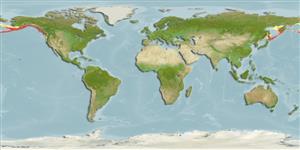Environment: milieu / climate zone / depth range / distribution range
Οικολογία
Θαλασσινό(ά) βενθικό(ς); εύρος βάθους 46 - 350 m (Ref. 2850). Temperate
Eastern Pacific: southeast Bering Sea to Eureka, northern California, USA.
Μέγεθος / Βάρος / Age
Maturity: Lm ? range ? - ? cm
Max length : 30.0 cm TL αρσενικό/απροσδιόριστο; (Ref. 2850)
Short description
Κλείδες προσδιορισμού | Μορφολογία | Μορφομετρία
Ραχιαίες άκανθες (συνολικά) : 60 - 69; Μαλακές ραχιαίες ακτίνες (συνολικά) : 0; Εδρικές άκανθες: 3; Μαλακές εδρικές ακτίνες: 45 - 49. Caudal rounded.
Apparently lives partly buried in mud bottoms (Ref. 2850, 4925).
Life cycle and mating behavior
Γεννητική Ωρίμανση | Αναπαραγωγή | Γεννοβολία | Αβγά | Γονιμότητα | Προνύμφες
Eschmeyer, W.N., E.S. Herald and H. Hammann, 1983. A field guide to Pacific coast fishes of North America. Boston (MA, USA): Houghton Mifflin Company. xii+336 p. (Ref. 2850)
IUCN Red List Status (Ref. 130435: Version 2024-1)
Threat to humans
Harmless
Human uses
Εργαλεία
Special reports
Download XML
Διαδικτυακές πηγές
Estimates based on models
Preferred temperature (Ref.
123201): 3.3 - 7.1, mean 5.2 °C (based on 167 cells).
Phylogenetic diversity index (Ref.
82804): PD
50 = 0.6250 [Uniqueness, from 0.5 = low to 2.0 = high].
Bayesian length-weight: a=0.00389 (0.00180 - 0.00842), b=3.12 (2.94 - 3.30), in cm total length, based on all LWR estimates for this body shape (Ref.
93245).
Τροφικό Επίπεδο (Ref.
69278): 3.0 ±0.00 se; based on food items.
Fishing Vulnerability (Ref.
59153): Low vulnerability (20 of 100).
